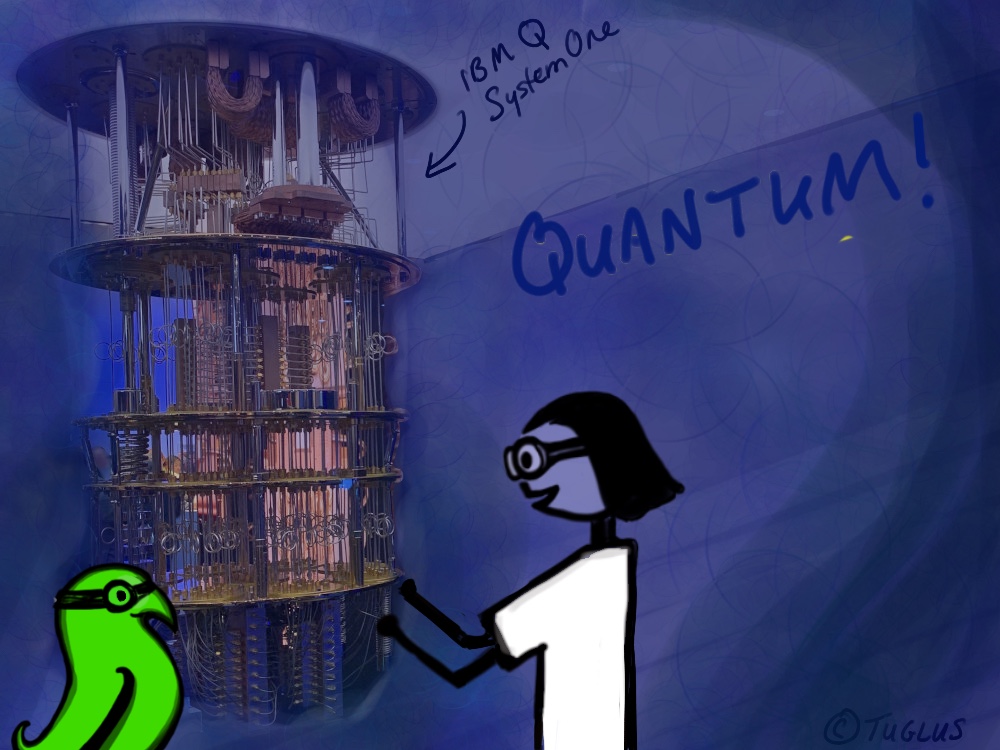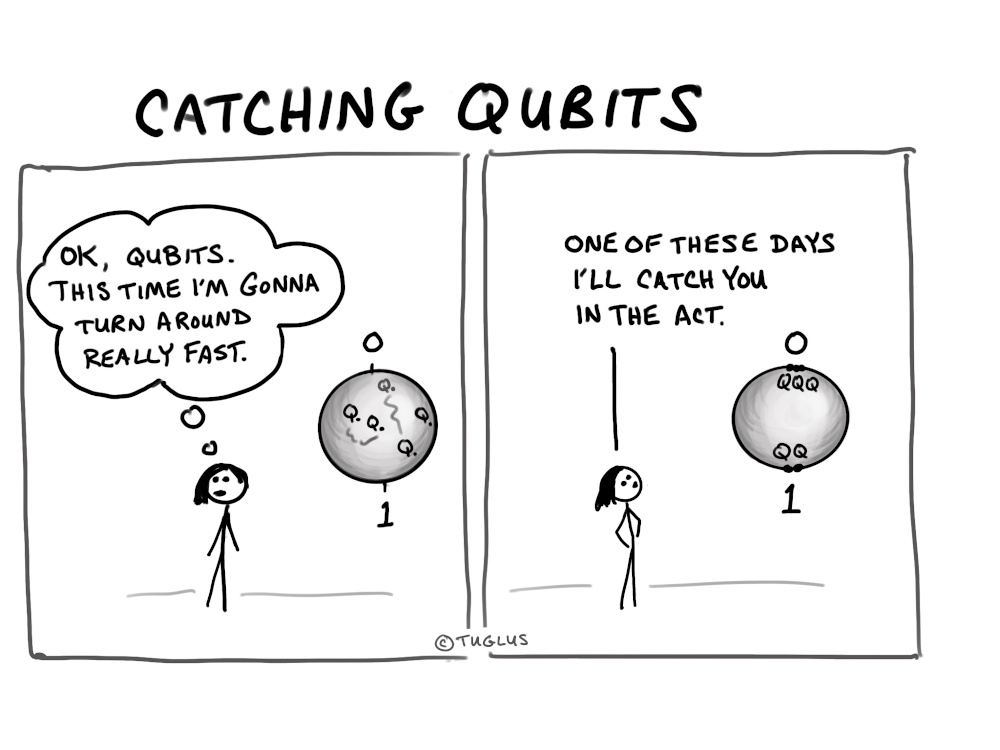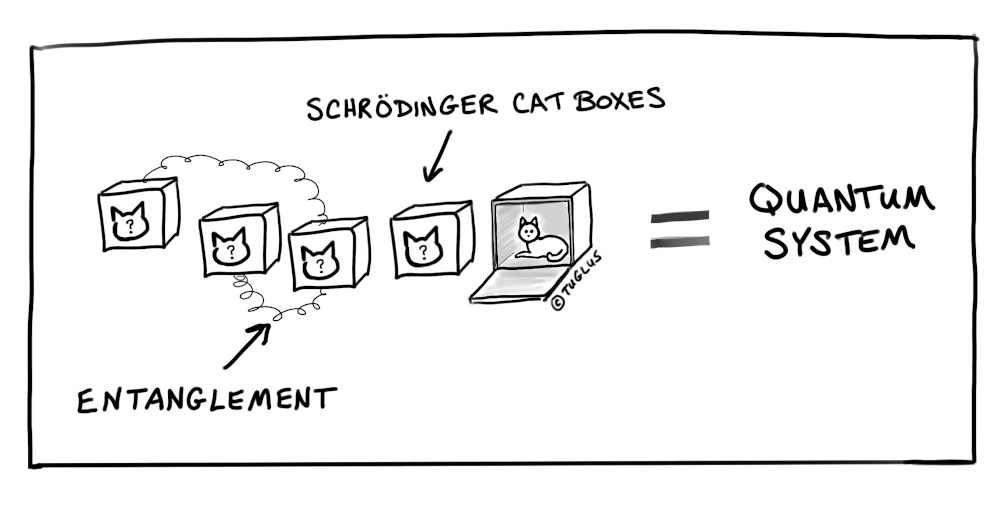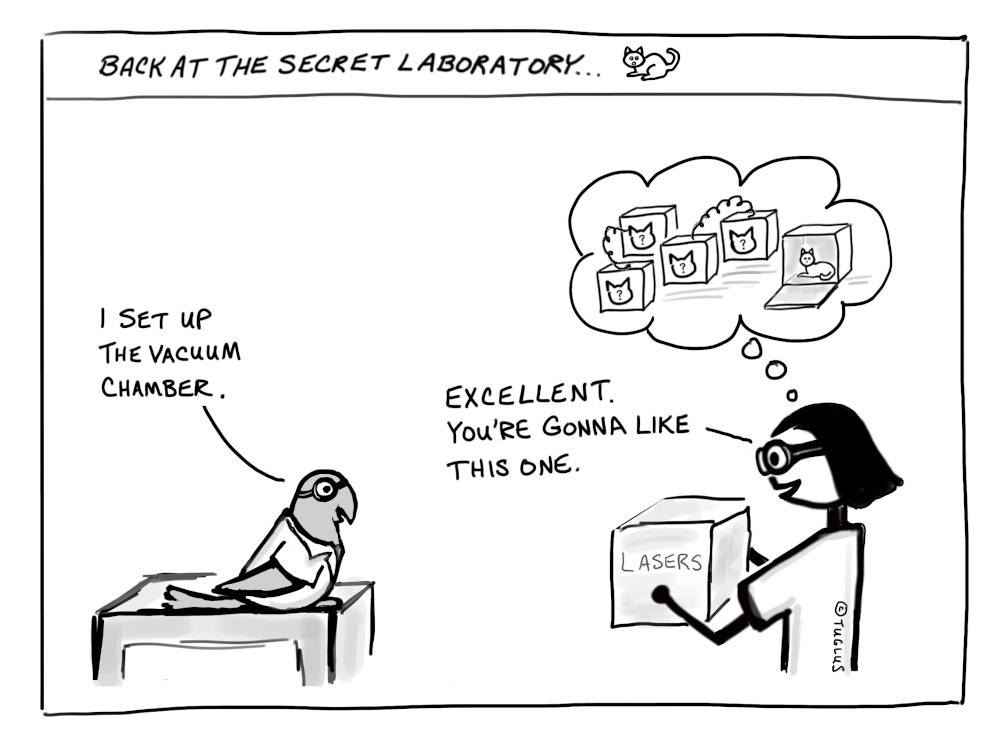
Quantum Computing is becoming a hot topic, gaining popularity and hype. So it’s time to dig in and see what is really going on. Conveniently, one of my best friends, Professor Andy Geraci, is a quantum researcher and teaches graduate quantum physics at Northwestern University. He loves the theoretical, and I love to figure out what’s practical. I initiated an intense science discussion, and have created a window into one of our classic “scientist meets engineer” moments. For your sanity, I will provide an abbreviated transcript. Following that, I’ll leave you with a great link to more quantum education, and my thoughts and takeaways for pragmatists.
Some insights into the science of quantum, with Professor Andy Geraci:
NOTE: For simplicity, I’m “A” and Professor Geraci is “X” throughout this conversation.
A: Let’s start simple. What is Quantum Computing?
X: Let’s go back to what computing is in general – a system where you can encode some information, in bits, classically in ones and zeros. Through manipulation of the system, you can flip those ones and zeros. The Quantum version replaces those bits with new bits. These new bits, called qubits, can be ones, zeros, or they can have some component of both states at the same time. These qubits can become correlated, or entangled, which allows for a massively parallel operation that can do many calculations at the same time. To control the qubits you’ll need a universal set of control gates.
A: OK, tell me more about this mysterious third state. I’ve heard people say that in this third state, the qubit is simultaneously both zero and one, but that’s not precisely true, is it? You said “some component of both.” Can it really be both, or are we getting probabilistic here?
X: You’re right. It’s more like a continuum. Imagine a sphere, where zero corresponds to the north pole and one corresponds to the south pole. When you are measuring the qubit, it is always a zero or a one. But otherwise, it has the chance of existing anywhere within that sphere between the one and zero. There is a lot of linear algebra involved in calculating, if you want –
A: Maybe we’ll save that math for another day. Hmm…so when I’m looking at the qubits, they fall into place at zero or one. But when I turn my back on them, they could be anywhere…

A: I understand there is some fancy measuring going on in order to catch the qubits in action, or at least infer their action, since looking directly at them does not work. For simplicity here, we’ll just assume that there are ways, like lasers, to do that. You know, as I think about this, I’m getting some flashbacks to undergrad. This sounds like Schrödinger’s cat. The cat inside a box that has an equal probability of being alive or dead, until you open the box and know for sure. Theoretically, of course. Are qubits just Schrödinger cat boxes?
X: Yes. If you string them together in some way, so they correlate or entangle.
A: OK, so if I take a bunch of Schrödinger cat boxes…Connect them with a super tiny version of those strands of holiday lights that always tangle up…Voila, a quantum system.
X: Uh, yeah.

A: Got it. Now how do I control my cat boxes (or qubits)?
X: Usually using some kind of radiation: if it is a superconducting qubit, you might use microwave radiation. If its an ion, you might use an optical laser. Sometimes you are performing single manipulations on the state of a qubit. And sometimes you are entangling them. There are different strategies for how you perform a computation.
A: Let’s talk entanglement. What’s the deal?
X: Unlike normal bits, qubits become correlated or entangled together. Which means that a measurement of one part of the system implies something about another part of the system. For instance, if you have 2 entangled particles, then if one particle is behaving a certain way, then based on that, the second particle is behaving in a predictable way. This is what allows parallelism. Which enables fast calculations.
What can Quantum Computing really do for me?
A: Fast calculations, you say. That sounds interesting and potentially applicable. Parallel calculations, fast computing – in theory, this is useful. But what can I actually do with quantum computers, that I can’t do with classic computers?
X: That’s a very good question. There are only a handful of things right now that quantum is believed to be able to do better. Grover’s search algorithm. Shor’s algorithm. Quantum computers are fast. Somewhat scalable. But highly susceptible to noise, such as vibration and artifacts in the materials. There are challenges right now in achieving a large number of qubits and in achieving high fidelity (low errors).
A: So there is a lot of noise in the system. It is clear that quantum computing is still far from a commercial use. Speaking of noise, let’s talk hype. There is a lot of hype in advanced technology. For instance, “AI” is touted as a cure-all and shows up everywhere. For a while “blockchain” was everywhere. Do you know of any “Quantum Computing” out there that isn’t actually using quantum? Is this a problem yet for quantum?
X: Everything is quantum mechanical at some level. So there could be a lot of latitude for when it is appropriate to say something is using quantum principles. Then there are some quantum effects like entanglement, that have no classical analog. There is potential for abuse of the term “quantum,” but it is unlikely right now as most quantum funding is provided by governments and foundations that rely on peer-reviewed research.
A: So right now it is fairly legit, though there will definitely be some hype in the future to detangle. Good to know. Let’s get into the engineering side of this.
Where do Qubits come from?
A: Can I make a qubit out of anything?
X: Good question. Yes, but certain materials are a lot easier to work with.
A: Cool. What about light, photons?
X: Yes, but light moves really fast…you know, at the speed of light? Light is good for transporting. It is hard to trap and hold photons.
Could I build a Quantum computer in my basement?
A: Suppose I wanted to build a quantum computer in my basement. What would I need?
X: How many qubits? And it depends on the type of quantum computer. If you’re talking superconductors, you would need a dilution refrigerator.
A: Let’s keep it simple. Since there isn’t a clear business application at this point.
X: For a laser trapped ion quantum computer: Lasers, optics, mirrors, lenses, vacuum chambers, photo detectors, cameras, equipment to control and stabilize the lasers… $500-600K and you’re all set.
A: What about vibration? You said it would be susceptible to noise, artifacts in materials… Why are there quantum computing startups in earthquake-prone California?
X: Floating table.
A: Nice. I’ll add that to the list. Like an air hockey table?
X: No, the table itself is floating on air. Not the stuff floating on the table.
A: Does it need to be really cold? And does it emit anything – heat, radiation?
X: No, for this setup you’ll use laser cooling. Other than eye protection, to make sure you don’t get blinded, it’s pretty safe.
A: Excellent. Thanks for sharing some of your expertise, Professor Geraci. If someone wanted to learn more, or take one of your classes, where should they look?
X: http://faculty.wcas.northwestern.edu/andrew-geraci/index.html
For more quantum education:
Andy shared some of the basics with us, but if you want more on how it works, there is a great video on the IBM site by Dr. Talia Gershon here: https://www.ibm.com/quantum-computing/learn/what-is-quantum-computing.
What’s the Takeaway? (for non-scientists)
From my research, and those insights provided by Andy, here is my take on what has been going on in the science community:

Different environments are still being experimented with (#1), with the real focus today resting heavily on #2 and #3, with different companies and researchers using a variety of materials to create qubits. The race appears to be who can create the largest qubit computer, followed by improving error resolution. By the way, those things are interconnected – introducing more qubits introduces more noise. So whoever has the most qubits is not necessarily the coolest. Don’t be fooled.
It is probably becoming clear to you that quantum computing is still in the lab. Every quantum computer is custom built, prone to errors, and has a relatively small number of qubits corralled. This technology is early in its evolution. As the science evolves, there will be hardware and middleware built to form reproduceable quantum computers. When you see that happen, it will be time to pay attention.
What really needs a quantum computer?
Note that “Figure out what to calculate that really needs a quantum computer,” is last on the list. You will hear people talk about trying to break RSA encryption, and you’ll hear about Shor’s algorithm, and Grover’s algorithm. But unless you are a physicist, all of that is pretty esoteric.
In the next 3 years, it is highly unlikely that quantum computing will become useful. I believe that we are early in the hype phase, and will see a lot more hype in the coming years, before the science moves away from theory and pure experimentation, and firmly into practice. Which may take a very long time. Big tech companies like IBM and Microsoft are making big bets on this. But that is their job. Quantum definitely has the potential to play a big role in the next frontier of tech, it just has a ways to go.
That being said, even though you cannot use it for something practical yet, it can still be fun science. But for business folks, there is no need to invest in a quantum lab yet. Instead, if you want to spend time thinking about quantum computing, help the scientists with #4: Figure out what to calculate that really needs a quantum computer.
Until next time,
– A.
